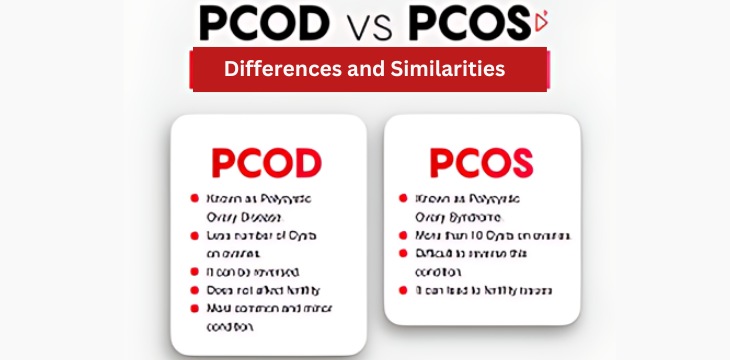Ever felt like PCOD vs PCOS are two sides of the same coin? Well, you’re not alone! These two acronyms get thrown around quite a bit, often causing confusion. But don’t sweat it; we’re here to break it all down for you. PCOD (Polycystic Ovarian Disease) and PCOS (Polycystic Ovary Syndrome) might sound similar, but they have distinct differences and unique characteristics. Ready to dive in and understand what sets them apart and what ties them together? Let’s get rolling!
What is PCOD?
Polycystic Ovarian Disease (PCOD) is a condition where a woman’s ovaries produce a significant number of immature or partially mature eggs, which over time, turn into cysts. This leads to the ovaries becoming enlarged and secrete large amounts of androgens, causing havoc on a woman’s hormonal balance.
Symptoms of PCOD
- Irregular menstrual cycles
- Weight gain
- Hair loss
- Acne and oily skin
- Infertility issues
Causes of PCOD
- Unhealthy lifestyle
- Stress and anxiety
- Hormonal imbalances
- Genetic predisposition
What is PCOS?
Polycystic Ovary Syndrome (PCOS), on the other hand, is a metabolic disorder that goes beyond just the ovaries. It affects the endocrine system, leading to a range of symptoms and health issues. PCOS is considered more severe than PCOD due to its broader impact on the body.
Symptoms of PCOS
- Irregular or absent periods
- Excessive hair growth (hirsutism)
- Severe acne
- Obesity
- Infertility
- Insulin resistance
Causes of PCOS
- Genetic factors
- Insulin resistance
- Inflammation
- Hormonal imbalances
PCOD vs PCOS: Key Differences
Understanding the nuances between PCOD vs PCOS can feel like splitting hairs, but these differences are crucial for diagnosis and treatment.
Impact on the Body
- PCOD: Primarily affects the ovaries and is more localized.
- PCOS: A systemic condition affecting multiple body systems, including metabolic and endocrine systems.
Severity
- PCOD: Generally considered less severe and more manageable with lifestyle changes and medication.
- PCOS: Often requires a more comprehensive treatment approach due to its widespread impact.
Hormonal Differences
- PCOD: Characterized by the presence of numerous cysts in the ovaries due to the failure of egg release.
- PCOS: Involves hormonal imbalances that can lead to multiple symptoms beyond the ovaries, including insulin resistance and metabolic syndrome.
Diagnosis and Treatment PCOD vs PCOS
Getting diagnosed with PCOD or PCOS can feel like a punch to the gut, but understanding the right approach to treatment can make a world of difference.
Diagnosis
- Medical History: Discussing symptoms and family history with a healthcare provider.
- Physical Examination: Checking for physical signs such as hirsutism, acne, and obesity.
- Ultrasound: To look at the ovaries and check for the presence of cysts.
- Blood Tests: To measure hormone levels and screen for insulin resistance.
Treatment Options
For PCOD:
- Lifestyle Changes: Healthy diet, regular exercise, and stress management.
- Medications: Birth control pills to regulate menstrual cycles, anti-androgens to reduce symptoms like acne and hair loss.
- Fertility Treatments: In cases of infertility, medications like Clomiphene may be prescribed.
For PCOS:
- Lifestyle Changes: Emphasis on a balanced diet, weight management, and physical activity.
- Medications: Metformin for insulin resistance, birth control pills to regulate hormones, and anti-androgens.
- Fertility Treatments: Options include ovulation-inducing medications and assisted reproductive technologies like IVF.
Living with PCOD vs PCOS
Managing life with PCOD or PCOS is no cakewalk, but with the right strategies, it’s absolutely possible to lead a fulfilling life.
Tips for Managing Symptoms
- Regular Exercise: Helps in weight management and improving insulin sensitivity.
- Healthy Eating: Focus on a balanced diet rich in fruits, vegetables, lean proteins, and whole grains.
- Stress Management: Incorporate relaxation techniques such as yoga, meditation, or even a good old bubble bath.
- Routine Check-Ups: Regular visits to the healthcare provider to monitor symptoms and adjust treatments as necessary.
FAQs
Q: Can PCOD turn into PCOS?
A: No, PCOD and PCOS are distinct conditions. However, untreated PCOD can lead to symptoms similar to those seen in PCOS over time.
Q: Can I get pregnant if I have PCOD vs PCOS?
A: Yes, many women with PCOD or PCOS can get pregnant with the right treatment and lifestyle changes. Fertility treatments are also available to assist.
Q: Are PCOD vs PCOS curable?
A: Both conditions are chronic, meaning they can be managed but not cured. With proper treatment, symptoms can be significantly reduced.
Q: Is weight gain inevitable with PCOD vs PCOS?
A: Weight gain is common but not inevitable. Healthy lifestyle choices can help manage and even prevent weight gain associated with these conditions.
Conclusion
Navigating the murky waters of PCOD vs PCOS can be tricky, but understanding the key differences and similarities can make a huge difference in managing these conditions. Remember, while both PCOD and PCOS can be challenging, they are manageable with the right approach. Regular check-ups, a balanced lifestyle, and a good support system can help you lead a healthy, happy life despite these hormonal hurdles. So, chin up, and take control of your health journey!
